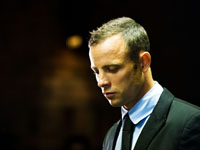
Top stories






More news













On Tuesday 25 February Gauteng judge president Dunstan Mlambo ruled in favour of an application by Multichoice and Eyewitness News to broadcast the trial. It will be shown on two news channels on satellite TV service DStv, as well as on eNews Channel Africa (eNCA) and a special channel under the banner of MNet's investigative programme Carte Blanche.

But the judge ruled that only certain parts of the trial - the opening and closing arguments, expert witness testimony, judgment and sentencing - may be broadcast on TV. Radio broadcaster Eyewitness News, eNCA and Multichoice will, however, be allowed full audio coverage of the trial.
Under Mlambo's ruling, Multichoice must provide a free feed to other television channels. According the Associated Press, the broadcasts may also be made available to international stations through a sharing agreement.
Eyewitness News editor-in-chief Katy Katopodis said in her web column that the ruling was a sign the justice system was moving with the times. She said the live broadcast of the trial will simply be an extension of the live tweeting reporters do when covering court cases. The broadcast, she said, would be no different from the principle of open justice, under which any person was allowed to walk into a courtroom and listen to a case.
Normal witnesses can refuse consent to have their testimony broadcast, Katopodis said. "We can, however, have the testimony of witnesses who are expert witnesses, whose job essentially it is to give testimony in court cases like this."
In the hearing, Pistorius' lawyers argued that television cameras in the courtroom would prevent him from having a fair trial. They said the broadcast of witness evidence may allow tailoring, fabrication and adaption of evidence.
But Mlambo said the trial is in the public interest and having cameras in the courtroom would ensure a greater number of people, especially those unable to attend the proceedings, would be able to follow it wherever they may be. "Particularly those who are poor and who have found it difficult to access the justice system, they should have a first-hand account of the proceedings involving a local and international icon."
Meanwhile, Pistorius' public relations team has launched a Twitter account - @OscarHardTruth - which it claims will reveal the truth about the shooting.
Pistorius' family has also made the decision to turn his official website, once used to chronicle his exploits on the track and his charitable activities, into a news website featuring the latest developments in his trial, and a space for messages of support.
The website states that it will provide the opportunity for the media to make enquiries or requests, but the family may not always respond or comment because of legal reasons.
Judge Mlambo's ruling has been hailed as a victory for media freedom, but he did impose a number of conditions to ensure broadcasters would not interfere with proceedings. These include:
Follow the trial on Twitter
Barry Bateman
Eyewitness News Pretoria correspondent Barry Bateman will cover the trial for Primedia's radio stations, and live-tweet it as it unfolds. Bateman was one of the first to report the case on Twitter, sending his follower count up by over 100,000 in the week after Steenkamp's death. Bateman is also co-author, with his colleague Mandy Wiener, of a forthcoming book about the case. Follow him @barrybateman.
Talk Radio 702
Gushwell Brooks: @GushwellBrooks
David O'Sullivan: @702David
eNCA
Annika Larsen: @AnnikaLarsen1
Karyn Maughan: @karynmaughan
Carte Blanche
Carte Blanche: @carteblanchetv
Derek Watts: @DerekWatts
Bongani Bingwa: @bonglez
Devi Sankaree-Govender: @Devi_SG
Oscar Pistorius
Oscar Pistorius's public relations team: @OscarHardTruth
MediaClubSouthAfrica.com is hosted by the International Marketing Council of South Africa (IMC), the custodian of Brand South Africa. The site is a free service for all media professionals - journalists, editors, writers, designers, picture editors and more - as well as for non-profit organisations and private individuals. Its specific focus is on South Africa and Africa.
Go to: http://www.mediaclubsouthafrica.com/